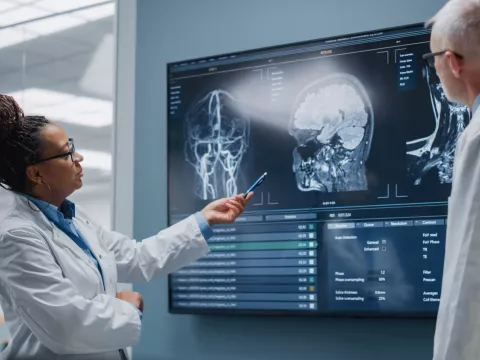- AdventHealth

Choose the health content that’s right for you, and get it delivered right in your inbox.
Your brain, spinal cord and nervous system help coordinate nearly every activity in your body. With such an important role, it’s no wonder there are not one but two medical specialties involved in supporting your health in these areas: neurology and neurosurgery. These two medical specialties are unique but come together to care for patients in different ways.
If you’re curious about the differences between neurology and neurosurgery, we’re here with answers to your questions.
What Is Neurology?
Neurologists are trained physicians specializing in diagnosing and treating brain, spinal cord and nervous system conditions. For patients with chronic neurological disorders, these skilled practitioners are often the lead primary care providers and collaborate with other specialists on care coordination.
These specialists treat many conditions, including:
- Alzheimer’s disease
- Amyotrophic lateral sclerosis (ALS)
- Brain and spinal cord tumors
- Concussions
- Dementia
- Epilepsy
- Headaches and migraines
- Multiple sclerosis
- Parkinson’s disease
- Peripheral nerve disorders
- Sleep disorders
- Stroke
- Tremors
Neurologists diagnose and treat these conditions through non-surgical methods, such as minimally invasive testing, medication, and physical and occupational therapy.
What Is Neurosurgery?
Much like neurologists, neurosurgeons diagnose and treat brain and spinal cord conditions. However, these specialists use a combination of surgical and non-surgical techniques.
Some conditions neurosurgeons treat include:
- Aneurysms
- Blocked arteries
- Brain and spinal cord tumors
- Carpal tunnel syndrome
- Chronic back and neck pain
- Congenital brain and spine conditions
- Herniated discs
- Parkinson’s disease
- Peripheral nerve disorders
Some of the surgeries neurosurgeons perform include:
- Brain surgery, such as aneurysm repair surgery
- Peripheral nerve surgery, like carpal tunnel surgery
- Spine surgery, including spinal fusion surgery
How Neurology and Neurosurgery Are Different
While neurologists use non-surgical techniques, such as medications, to diagnose and treat neurological conditions, neurosurgeons use a combination of surgical and non-surgical procedures to help care for patients.
Patients experiencing neurological conditions will generally start their care with a referral to a neurologist. For emergencies like a stroke or aneurysm, though, they may see a neurosurgeon first. During this appointment, the neurologist will conduct a thorough physical exam and run tests to diagnose the condition. This physical exam may include balance, coordination, strength, mental health, vision, hearing and speech tests. From there, neurologists will develop a personalized care plan and will usually be the point person for neurology-related conditions moving forward.
These two specialties often collaborate in patient care. For instance, you might be referred to a neurosurgeon for surgical treatment after seeing a neurologist. Or, patients who received emergency neurosurgery may be referred to a neurologist for continued care of chronic conditions.
Count on Our Neurology and Neurosurgery Teams
At AdventHealth, we offer whole-person care for your whole nervous system. Whether you need a neurologist or neurosurgeon, our expert neurological teams are here to care for you with the latest technology and a personalized approach to your treatment.




